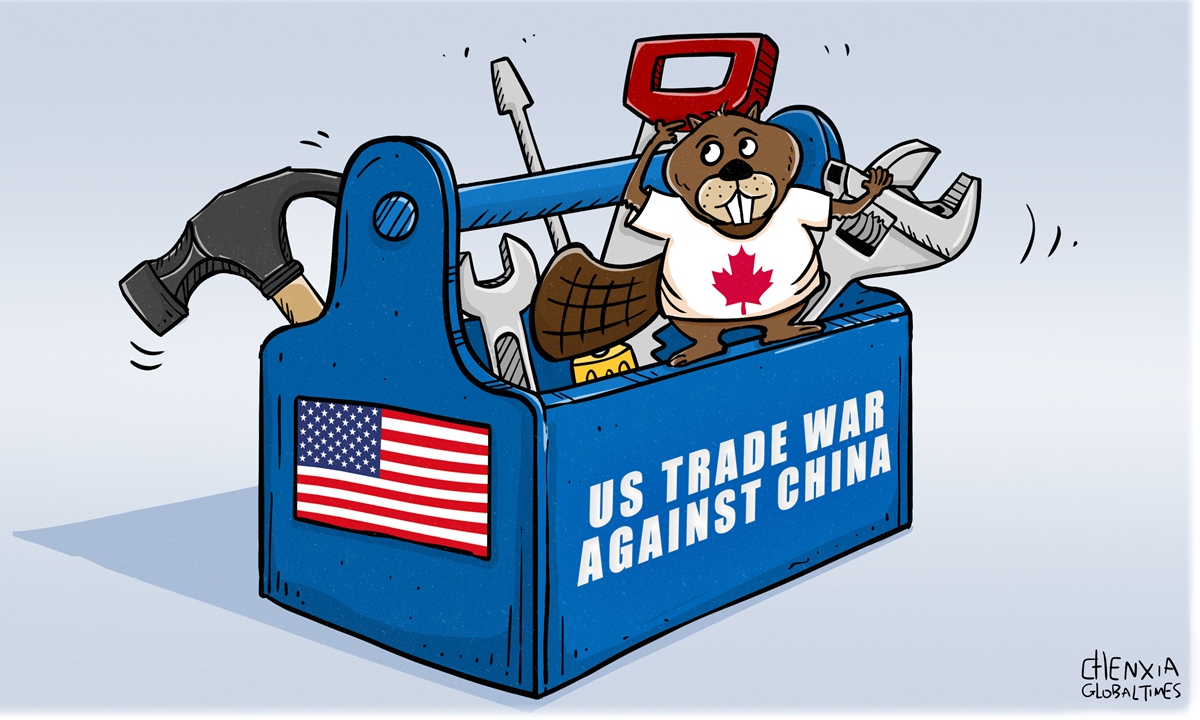
Illustration: Chen Xia/Global Times
It's no secret that for the US government, a trade war against China is not merely a byproduct of its international relations, but very much a fixture of it.
Although former US president Donald Trump was uncharacteristically brusque and overt about his attempts to foment economic war between the world's two largest economies, under his successor Joe Biden, the US has remained fixated on continuing a destructive trade war against China.
In early 2022, both branches of the US Congress passed an updated version of the COMPETES Act, which purports to "improve the competitiveness of the US." The act, whose full name is the America Creating Opportunities to Meaningfully Promote Excellence in Technology, Education, and Science Act, was first brought into law in 2007, and was revised and updated in 2011 and again this year.
The newly updated legislation isn't merely a call for increased US competitiveness, but is also a demand that Canada fall into line when it comes to the US trade war against China.
Canada is not merely in the peripheral vision of the COMPETES Act; it is a central player.
As pointed out in a recent analysis by the Montreal-based Policy Options magazine, Canada is mentioned over 30 times in the legislation, and the legislation calls on the US government to "enhance cooperation with the Government of Canada in managing relations with the PRC [People's Republic of China] government."
Canadian policymakers, and indeed all Canadians, ought to be worried by the COMPETES Act's laser focus on Canada, and the potential implications.
In recent years, the US has applied heavy pressure on Canada when it comes to China. Whether with respect to banning Huawei, arresting its executive Meng Wanzhou in Vancouver at the behest of the US authorities, or by strong-arming Canada into accepting a new clause in the US-Mexico-Canada Agreement which effectively limited Canada into entering a new trade deal with China, Ottawa has found itself squarely in Washington's cross hairs as a useful weapon in the US' ongoing economic war against China.
Any Canadian who thinks that the Trump administration was anomalous in this respect would do well to listen to the new Biden-appointed American Ambassador to Canada, David Cohen, who in September 2021 referred to the "existential threat that is China" and called on Canada to publicly fall into line with US strategy on Beijing.
There should be no doubt: As far as Washington is concerned, Canada is not a sovereign state, but a mere cog in the US' wheel to ensure as much economic and technological power as possible.
As Policy Options magazine remarked, "The Americans are asking Canada to help it achieve pre-eminence in technology and economic strength. The only thing missing is a section calling for Canada to pick up the US delegation's dry cleaning at G7 summits."
Canada should not so easily let its own foreign policy be dictated by its neighbor to the south. As home to one of the largest deposits of multiple natural resources, with a highly diversified about $2 trillion economy, and one of the fastest-growing populations in the developed world, Canada is uniquely positioned to advocate for itself and its own interests in the global arena that does not require itself to obsequiously serve the diktats of Washington, DC.
Nor should Canada blithely believe that its interests necessarily will always align with that of the US. The never-ending culture wars in the US, whether over abortion access or gun control, have shown a distinctly different culture and value set between the two countries. Additionally, American economic hegemony would only allow the US to exert more pressure, not less, on Canada, forcing Ottawa to follow Washington's directives, whether it helps Canadians or not.
Standing up to pervasive US pressure on China will not be easy. It will require political strength on Canada's part, as well as the recognition on the part of everyday Canadians that Ottawa should not simply follow Washington's lead in a new economic cold war, particularly if it is only harmful to Canada's national interests. Canadians should create their own foreign policy, based on their own values and interests, not simply what the US pressures Canada into doing.
The author writes about relations between China and the West. He's based in Canada. opinion@globaltimes.com.cn

